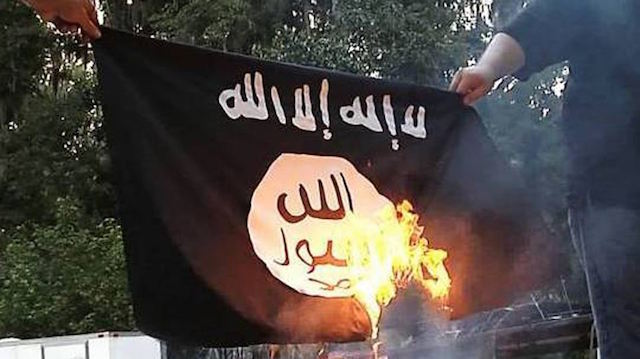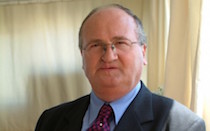Hol Dir den wöchentlichen SPARTANAT-Newsletter.
Dein Bonus: das gratis E-Book von SPARTANAT.

Wie Daesch bekämpft werden soll
Allein in Frankreich seien 2015, laut Innenminister Bernard Cazeneuve gegenüber dem TV-Sender France 5, elf Anschläge „von der Art wie die vom 13. November“ verhindert worden.
Allein in Frankreich seien 2015, laut Innenminister Bernard Cazeneuve gegenüber dem TV-Sender France 5, elf Anschläge „von der Art wie die vom 13. November“ verhindert worden. Das auf Europa übergelegt, zeigt die Dimension des islamistischen Terrors und ganz besonders jene Gefahr, die von einer Großstruktur dahinter wie dem Islamischen Staat (IS) – umgangssprachlich und abwertend „Daesch“ genannt – ausgeht. Gestern hat es Berlin erwischt mit einem Anschlag mit LKW auf einen Weihnachtsmarkt im Stile des Massakers von Nizza. Martin van Creveld ist einer der führenden Militärhistoriker weltweit. Er hat sich auch intensiv mit Themen wie Guerillakrieg/Terror und Aufstandsbekämpfung beschäftigt. Auf SPARTANAT setzt er sich vor diesem Hintergrund mit der Frage auseinander, wie der Kampf gegen IS/Daesch konsequent und erfolgreich geführt werden kann. Der Artikel ist ursprünglich im Jänner 2016 auf SPARTANAT erschienen, aus Aktualitätsgründen veröffentlichen wir ihn heute wieder:
Seit Daesch im Frühjahr 2014 international das erste Mal wahrgenommen wurde, ist eine riesige Menge an Tinte darauf verschwendet worden, um Themen zu beschreiben wie etwa die Beziehung des IS zu seiner Mutterorganiation al-Qaida, seine Ziele, seine besondere Anziehungskraft auf muslimische Freiwillige aus aller Welt und auch die Methoden des IS – letztere, zeigt sich, stammen direkt aus den Tagen als Mohammed und seine Anhänger ihren ersten Terror- und Eroberungsfeldzug starteten. Einschließlich Enthauptungen, Kreuzigungen und die Versklavung, sowohl von Männern wie auch Frauen. Wer sich dafür interessiert, kann gerne die bereits vorhandene Literatur konsultieren; ich möchte mich hier auf die wichtigste aller Fragen konzentrieren, nämlich wie man gegen Daesch kämpft und gewinnt.
Wir müssen vier verschiedene Aktionsfelder unterscheiden, nämlich:
1. Syrien und Irak. Im Kern ist Daesch das Produkt der närrischen amerikanischen Invasion im Irak. Der ehemalige ägyptische Präsident Hosni Mubarak hat das Ergebnis vorhergesagt, indem ein traditionelles islamisches Bild verwendet hat, es würden „die Pforten der Hölle geöffnet“. In diesen beiden Ländern ist Daesch entstanden und dort sind auch die meiste seiner Kämpfer konzentriert. Der Kern des Problems ist politisch. Die Präsidenten Obama, Putin und Erdogan müssen sich endlich entscheiden, wer der Hauptfeind ist und gegen diesen zusammenarbeiten. Selbst wenn es bedeutet, dass Präsident Assad im Amt bleibt, zumindest vorübergehend. Die USA, Russland und die Türkei müssen eine gemeinsame Luftoffensive gegen Daesch führen und dabei deren Kräfte in Syrien ebenso ins Visier nehmen, wie die Ölfelder im Irak, von wo sie ihre Einnahmen generieren. Dennoch, nach über einem Jahr mit Schlägen von Luftwaffe und Drohnen zeigt sich nur zu klar, dass es Luftangriffe allein nicht schaffen werden. Dafür braucht man die Unterstützung der syrischen Bodenstreitkräfte. Um es gleich zu sagen, das bedeutet, dass man sich mit einigen sehr widerwärtigen Typen und Ländern zusammentut. Aber welche andere Wahl gibt es? Solange die Hauptkräfte und die Führung von Daesch nicht zerschlagen sind, wird sich der Terror fortsetzen. Wenn nicht hier, dann dort, und wenn nicht dort, dann da.
Solange die Hauptkräfte und die Führung von Daesch nicht zerschlagen sind, wird sich der Terror fortsetzen. Wenn nicht hier, dann dort, und wenn nicht dort, dann da.
2. Frankreich und Europa. Hört auf mit dem lamentieren und fangt an die Einwanderung mit allen nötigen Mitteln zu kontrollieren – mit dem Ziel sie ganz zum Stillstand zu bringen. Auch am Meer, mit Blick auf Libyen. Installiert vernetzte, passive Verteidigungseinrichtungen. Das bedeutet Wachposten, Metalldetektoren und Überwachungskameras in jedem Parkhaus, in jeder Schule, Universität und Theater, etc. Wenn es nötig ist, sollten die Sicherheitsleute bewaffnet und in Selbstverteidigung geübt sein. Solche Maßnahmen sind keineswegs so teuer wie es klingt. Europa hat jede Menge Arbeitslose. Sie wären glücklich darüber zu arbeiten und ihre Löhne können mit dem gegengerechnet werden, was sie jetzt kosten. An den sensibelsten Punkte, wie etwa Flughäfen, muss Profiling zum Einsatz kommen, zum Beispiel indem Menschen in unterschiedlich gefährliche Gruppen zusammengefasst werden und jene, die zu den besonderen Gefährdern gehören, müssen besonders überprüft werden. Profiling mag nicht besonders demokratisch erscheinen. Egal, die Erfahrung zeigt, dass es funktioniert. Gründet einen freiwilligen Nachbarschaftsschutz – niemand kennt sich in der Nachbarschaft besser aus als jene Menschen, die dort leben. Gebt ihnen die technischen Mittel, um schnell Verstärkung herbeizurufen, wenn notwendig, und lasst sie eng mit der lokalen Polizei zusammenarbeiten. Diese Methode hat auch den Vorteil, dass die Leute sich engagieren können und dass sie den Menschen das Gefühl gibt, dass sie etwas tun können um zu helfen. Jeder Schaden, der von Terroristen angerichtet wurde, muss so schnell wie möglich behoben werden, so dass alle möglichst sofort in den normalen Alltag zurückfinden können.
Rüstet eure Nachrichtendienste auf. Gebt ihnen die modernste Überwachungsausrüstung und schafft solche Gesetze, die es ihnen auch erlauben sie zu verwenden. Konzentriert euch auf die Kommunikation.
3. Die Nachrichtendienste. Passive Maßnahmen alleine reichen nicht. Was benötigt wird, ist eine hochqualifizierte Organisation, die Terroristen identifizieren kann, die sie jagt, ihre Pläne im vorhinein durchkreuzt und sie entweder verhaftet – oder tötet, wenn notwendig. Gleichzeitig müssen die Geldflüsse, von denen die Terroristen abhängig sind, aufgespürt und ausgetrocknet werden. Also, rüstet eure Nachrichtendienste auf. Gebt ihnen die modernste Überwachungsausrüstung und schafft solche Gesetze, die es ihnen auch erlauben sie zu verwenden. Konzentriert euch auf die Kommunikation. Indem man es den Terroristen und ihren Unterstützern erschwert miteinander zu kommunizieren, entzieht man ihnen von ihrem Einfluss. Innerhalb der nationalen Grenzen achtet darauf, dass die einzelnen Abteilungen abgestimmt arbeiten. Jenseits der Grenzen, achtet darauf, dass die Grenzen dem Informationsfluss nicht im Weg stehen. Oder anders gesagt, die Dienste sollen mit ihren jeweiligen Gegenstücken in anderen Ländern eng zusammenarbeiten, ebenso mit der Polizei. Ein gesamteuropäischer Nachrichtendienstkoordinator, der verantwortlich ist für die Gesamtabstimmung, wäre sicher nützlich. Machen die politischen Probleme, die ein solches Büro dem Establishment bereiten, es zu einem unverwirklichbaren Traum? Wenn dem so ist, dann sollte es wohl nicht sein …
4. Die Gerichte. Wesentlicher Bestandteil jeder antiterroristischen Kampagne ist die Abschreckung. Also stellt sicher, dass die Richter jene Befugnisse haben, um zu tun, was getan werden muss. Die Schaffung einer Spezialgerichtsbarkeit mit besonderer Autorität für solche Fälle sollte in Erwägung gezogen werden. Die Bestrafung der Schuldigen sollte angemessen sein und flott nach dem Aufgreifen der Terroristen erfolgen. Sie sollte auch medial breite Aufmerksamkeit bekommen.
Das hier sind die Hauptelemente jedes erfolgreichen Anti-Terror-Feldzuges. Neben den Sachen, die man tun soll, würde ich aber zum Abschluss auch noch einige Empfehlungen abgeben, was man nicht tun darf:
1. Um jeden Preis muss verhindert werden, dass ein Mob echte oder vermeintliche Terroristen attackiert oder lyncht, ohne dass dem Gesetz genüge getan worden wäre. Blindwütig und ungezielt können solche Übergriffe großes Unrecht anrichten z.B. indem Personen verwechselt werden. Noch schlimmer, ermutigen sie jene Bevölkerungsgruppe, aus der die Terroristen stammen, zu mehr Zusammenzuhalten und zum Zurückzuschlagen. So kann man letztendlich genau bei dem enden, was man verhindern will, nämlich den Bürgerkrieg.
Der Krieg gegen den Terror wird nicht schnell gewonnen. Also sollten keine schnellen Ergebnisse erwartet werden.
2. Aus demselben Grund gilt es Kollektivstrafen zu vermeiden. Die Wahrscheinlichkeit, dass sie sich nur kontraproduktiv auswirken, ist sehr groß.
3. Der Krieg gegen den Terror wird nicht schnell gewonnen. Also sollten keine schnellen Ergebnisse erwartet werden und die Akteure dürfen sich auch nicht von Rückschlägen entmutigen lassen. Damit die Bevölkerung das versteht, braucht es eine nachhaltige PR Kampagne, die erklärt, warum diese Maßnahmen alle nötig sind, und warum alle Erschwernisse, die diese Maßnahmen mit sich bringen, nötig sind.
Viel Glück!
 MARTIN VAN CREVELD, einer der führenden Militärhistoriker der Gegenwart, wurde 1946 in Holland geboren. Seit 1950 lebt er in Israel. Er studierte an der London School of Economics und an der Hebrew University in Jerusalem, wo er seit 1971 als Professor für Geschichte lehrt. Bücher u.a.: „Kampfkraft“, „Gesichter des Krieges“, „The Sword and the Olive“, „Aufgang und Untergang des Staates“,… Darüber hinaus ist er als militärischer Berater und Referent in der gesamten westlichen Welt tätig.
MARTIN VAN CREVELD, einer der führenden Militärhistoriker der Gegenwart, wurde 1946 in Holland geboren. Seit 1950 lebt er in Israel. Er studierte an der London School of Economics und an der Hebrew University in Jerusalem, wo er seit 1971 als Professor für Geschichte lehrt. Bücher u.a.: „Kampfkraft“, „Gesichter des Krieges“, „The Sword and the Olive“, „Aufgang und Untergang des Staates“,… Darüber hinaus ist er als militärischer Berater und Referent in der gesamten westlichen Welt tätig.
Martin van Creveld im Internet: www.martin-van-creveld.com
Martin van Creveld auf SPARTANAT: Ein dreißigjähriger Krieg?
SPARTANAT ist das Online-Magazin für Military News, Tactical Life, Gear & Reviews.
Schickt uns eure News: [email protected]
Werbung
Hol Dir den wöchentlichen SPARTANAT-Newsletter.
Dein Bonus: das gratis E-Book von SPARTANAT.


